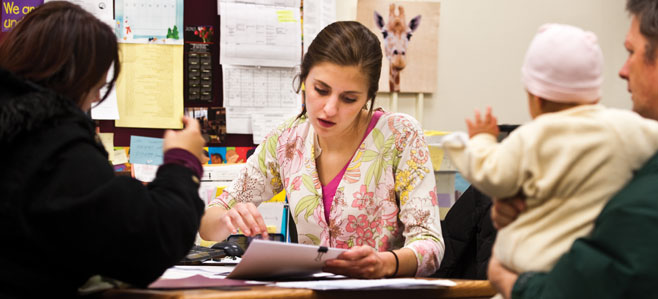
Student volunteers are central to the Center on Business and Poverty’s tax preparation program that returns more dollars to low-income workers.
Joe Wolfe has a bias against tax programs to help the poor. The benefits are fine with the Certified Public Accountant who spent years in tax practice. The forms are another matter.
“Some tax programs are so complicated the people eligible can’t fill out the forms,” said Wolfe, the chief executive officer of Wisconsin Business Development. This forces individuals and families who already have trouble making ends meet to pay a tax preparer or lose the benefit. Free Application for Federal Student Aid (FAFSA) forms are just as confusing. “They’re daunting,” Senior Vice President Pam Rich (’95 MBA BUS) said, so students who need help paying for college often don’t apply.
Through gifts to the University of Wisconsin-Madison’s Center on Business and Poverty (COBAP), Wolfe and Rich are helping bridge the information gap – and putting needed dollars into family pockets. Contributions from their company, Wisconsin Business Development, support the center’s free tax and student loan preparation service for low-income workers and students from Philadelphia to Stanford.
COBAP, an initiative of the Wisconsin School of Business in the Puelicher Center for Banking Education, supports ways for businesses to improve the financial stability of their low-income employees, director John Hoffmire said. The tax preparation program especially helps employees take advantage of the Earned Income Tax Credit, a federal program to boost the incomes of the working poor. COBAP works with credit unions, smaller UW System schools, businesses and non-profit agencies to set up the tax preparation sites. It also is the outreach arm of the Puelicher Center, director Jim Johannes said. It provides an opportunity for business students to improve lives by helping people take advantage of existing tax programs and set up bank accounts. In 2011 and 2012, COBAP provided resources to help fill out more than 1,800 income-tax and student-loan forms, resulting in an average tax return increase of $500.
COBAP secures volunteer site leaders through the federally sponsored Volunteer Income Tax Assistance (VITA) program and provides training. At Urban Strategies, a Milwaukee consulting firm that works with non-profit groups, the COBAP-supported AmeriCorps site leader recruited about 35 volunteers to staff two sites. The tax preparation service built relationships with clients, who, generally, earned $12,000 to $18,000 a year, project director Kathryn Berger (’92 JD LAW) said. The free service saved money for many clients who had previously paid $250 for tax preparation and had not received. Even more importantly, many of the clients returned throughout the year for financial coaching.
In 2011, the UW Credit Union, another COBAP supporter, and Progress Through Business reported similar benefits at 11 Madison and Milwaukee sites where 52 volunteers helped 517 low-income clients with tax and student-loan forms. They claimed $145,639 in Earned Income Tax Credits and $139,051 in education credits. “Overall, the program was a true success,” the final report noted. The tax preparation programs also improved employee retention by 32 percent, Hoffmire said.
The key is working through companies, Wolfe said. “If you can work with the business to endorse and sponsor the program, it has a much greater impact on the employees’ willingness to participate. The employer says, ‘We’re willing to invest the time and bring in the people in who can help.’ It’s like a company benefit, and it builds a bond between the employees and the business.”
He called the tax preparation effort a “but for” program: “But for Volunteer Income Tax Assistance volunteers sponsored by the Center on Business and Poverty using private dollars, hundreds would not be getting the help they need.” The objective is to keep expanding the program to reach more people, Wolfe said.
Wisconsin Business Development is especially interested in supporting the tax programs because it is committed to job creation in low-income communities, Wolfe said. Working with federal funds, the company invests in high-impact projects and designates a portion of fees from each project for community benefit.
“You’d think (tax preparation) is a small piece, but it has a huge impact,” Rich said. “It has huge community impact. When individuals learn to use the forms, they will do it year after year, and the dollars they get back will go into the community.”
